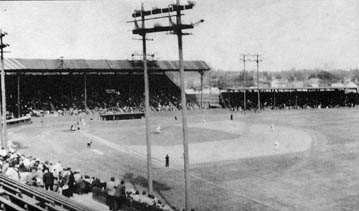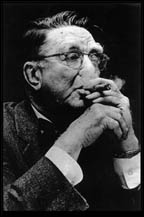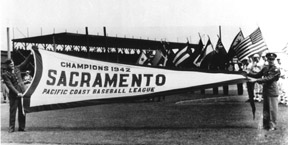 |
Cardinal Field
 |
 Branch Rickey was a catcher for the St. Louis Browns in 1903. When his playing career was ended by tuberculosis, he became a baseball coach at Ohio Wesleyan University and later earned a law degree from the University of Michigan. He returned to professional baseball in 1913 as assistant to the owner of the Browns. After being forced out of the Browns' organization by its new owner, Rickey joined the Cardinals' organization as field manager and later as the club's president and general manager.
Branch Rickey was a catcher for the St. Louis Browns in 1903. When his playing career was ended by tuberculosis, he became a baseball coach at Ohio Wesleyan University and later earned a law degree from the University of Michigan. He returned to professional baseball in 1913 as assistant to the owner of the Browns. After being forced out of the Browns' organization by its new owner, Rickey joined the Cardinals' organization as field manager and later as the club's president and general manager.
Because wealthier teams with larger scouting systems were consistently buying all the better players, Rickey invented a new way of getting good players by raising his own, by producing minor leaguers like crops that could be harvested periodically, through what has become known as the "farm" system. He began in 1919 by purchasing an interest in the Houston team in the Texas League, later acquiring full ownership of the team, and eventually owning 15 minor league teams and having working agreements with 17 others. In 1935, Sacramento became the Cardinals' tenth farm team. The Sacramento Union ran a contest to rename both the ball club and the field. "Solons," which the team was already informally being called, was the most popular name for the team, and "Cardinal Field," after the parent organization, was the selected as the new name for former Moreing Field.
On February 9, 1938, a windstorm caused major damage to the grandstand roof and entrance ramp of Cardinal Field. It cost almost $10,000 to repair, but the park was in good condition for opening day on April 2.
Cardinal Field was also the site of the only pennant victory in the team's history. It was 1942, shortly after the attack on Pearl Harbor, and Baseball Commissioner Kenesaw Mountain Landis had decided to go forward with the season only upon the suggestion of President Franklin D. Roosevelt.
The War took its toll on Sacramento baseball though. When the Solons' Spring training opened in Fullerton, California, only 16 players were available. There were no radio broadcasts, so the fans followed their team in the newspapers. War time dimout regulations forced the club to begin games at 5:30 instead of 8:15 p.m. To make matters worse, terrible weather in the first part of the season reduced the attendance to less than half of what it was at the same time the year before.
After falling out of first place by losing three straight games to Los Angeles, the Solons remained in second place for the rest of the season. As the season wound down, the Solons found themselves four games out of first place with only five games to go. Those five games were against the best fielding team in the PCL - the league leading Angels.
It wouldn't take a miracle, but in order to take the pennant the Solons would have to win all five of their last games. All odds favored Los Angeles to walk off with the title.
 The Solons managed to win the first of those crucial games on a Los Angeles error in the bottom of the ninth inning. They sailed through the second game 10-2 on the pitching of Tony Freitas. That took them to the final weekend of the season. They needed to win the Saturday game plus both games of the Sunday double header.
The Solons managed to win the first of those crucial games on a Los Angeles error in the bottom of the ninth inning. They sailed through the second game 10-2 on the pitching of Tony Freitas. That took them to the final weekend of the season. They needed to win the Saturday game plus both games of the Sunday double header.
It looked like it was all over on Saturday, when the Angels took the lead in the top of the 11th inning, but a two run homer by Gene Lillard in the bottom of the 11th won the game for Sacramento. It looked like it was all over again in the first game on Sunday, with the Solons down two runs in the bottom of the 8th. Then catcher Ray Mueller stepped up to the plate with a man on base. He slugged one over the fence as part of a four run rally that stole the game from the Angels. Reliable Tony Freitas saved the win in the ninth, coming in with only one day's rest since his victory the preceding Friday.
It was Tony Freitas again who pitched the final seven-inning game on Sunday. He threw a four hitter to beat the Angels 5-1. The Solons won the pennant, and Ray Mueller was voted the league's most valuable player, edging out Seattle's popular future PCL Hall of Famer, Kewpie Dick Barrett.
At the end of the 1942 season, Rickey left the Cardinals organization to join the Brooklyn Dodgers, where he would make even greater history by hiring Jackie Robinson. The Solons suffered from his departure, as the Cardinals began looking for a buyer for their PCL farm team. At the end of the 1943 season, a report that the team had been purchased by Tacoma prompted the formation of a local Sacramento Baseball Association, which quickly renegotiated with the Cardinals to buy the ballpark for $50,000 and to pay an additional $40,000 for the franchise and players. A newspaper contest the following year resulted in renaming the park after the alleged inventor of baseball, Abner Doubleday.
| HOME |
Copyright © 2003. William B.Shubb.